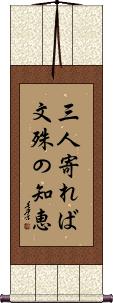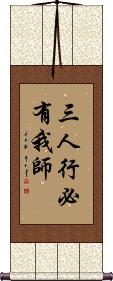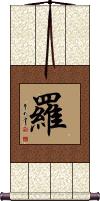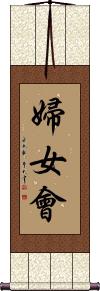Many custom options...
And formats...

Gather in Chinese / Japanese...
Buy a Gather calligraphy wall scroll here!
Personalize your custom “Gather” project by clicking the button next to your favorite “Gather” title below...
When Three People Gather, Wisdom is Multiplied
三人寄れば文殊の知恵 literally means “when three people meet, wisdom is exchanged.”
Some will suggest this means when three people come together, their wisdom is multiplied.
That wisdom part can also be translated as wit, sagacity, intelligence, or Buddhist Prajna (insight leading to enlightenment).
In the middle of this proverb is “monju,” suggesting “transcendent wisdom.” This is where the multiplication of wisdom ideas comes from.
Note: This is very similar to the Chinese proverb, "When 3 people meet, one becomes a teacher."
Note: Because this selection contains some special Japanese Hiragana characters, it should be written by a Japanese calligrapher.
When Three People Gather, One Becomes a Teacher
三人行必有我师 means “when three people meet, one becomes the teacher.”
This famous Chinese philosophy suggests that when people come together, they can always learn from each other.
One person must be the teacher and others learn. And in turn, the others become the teachers of the knowledge they possess.
It is important to remember that we all have something to teach, and we all have something to learn as well.
Luo
Surname
羅 is a character that can be the Chinese surname Luo.
This can also be the Japanese surname Ra, Ami, Ai, Rou, or Ro (and a few others).
The meaning is to collect, gather, catch, or sift. It may also refer to gauze, a lightweight fabric, or thin silk.
Sisterhood / Association of Women
婦女會 is an expression that means “sisterhood” as in a women's association, club, or group.
The first two characters mean “women.”
The last character means to assemble, to meet, to gather, to see, union, group, or association.
This in-stock artwork might be what you are looking for, and ships right away...
Gallery Price: $65.00
Your Price: $35.88
These search terms might be related to Gather:
Meet the Buddha, Kill the Buddha
Those Who Understand Are Clever, Those Who Know Themselves Are Truly Wise
Until We Meet Again
Not the results for Gather that you were looking for?
Below are some entries from our dictionary that may match your Gather search...
| Characters If shown, 2nd row is Simp. Chinese |
Pronunciation Romanization |
Simple Dictionary Definition |
羅 罗 see styles |
luó luo2 lo rou / ro ろう |
More info & calligraphy: Rowe(abbreviation) (See 羅甸語) Latin (language); (surname) Rou A net (for catching birds), gauze, open work; sieve; to arrange in order; translit. la and ra sounds, e.g. 南羅 S. Lāra; Lāḍa; Lāṭa, in Gujarāt; 北羅 N. Lāra, Valabhī, on the western coast of Gujarāt. |
鳩 鸠 see styles |
jiū jiu1 chiu hato はと |
More info & calligraphy: Pigeon / Turtle-Dovepigeon; dove; (surname, female given name) Hato A dove; to collect; translit. ku, gu, ko, ki; cf. 瞿, 拘, 倶, 矩. |
三牟提耶 see styles |
sān móu tí yé san1 mou2 ti2 ye2 san mou t`i yeh san mou ti yeh sanmudaiya |
More info & calligraphy: Samudaya |
團 团 see styles |
tuán tuan2 t`uan tuan madoka まどか |
round; lump; ball; to roll into a ball; to gather; regiment; group; society; classifier for a lump or a soft mass: wad (of paper), ball (of wool), cloud (of smoke) (personal name) Madoka Round; a ball, mass, lump; a group, company, train-band. |
屯 see styles |
zhūn zhun1 chun ton とん |
used in 屯邅[zhun1 zhan1] (ateji / phonetic) (kana only) ton (now usu. a metric ton, i.e. 1,000kg) (eng:); tonne; (out-dated or obsolete kana usage) (1) gathering; place where people gather; (2) (archaism) police station; camp; barracks; (given name) Ton Collect, mass; to quarter, camp. To sprout; very; stingy. |
戠 see styles |
zhí zhi2 chih |
to gather; old variant of 埴[zhi2] |
戢 see styles |
jí ji2 chi shū |
to restrain oneself; to collect; to hoard; to store up; to cease gather |
拾 see styles |
shí shi2 shih jitsu じつ |
to pick up; to collate or arrange; ten (banker's anti-fraud numeral) (numeric) ten; (place-name) Jitsu To gather, pick up, arrange; ten. |
捃 see styles |
jun jun4 chün kun |
gather; to sort v. 君. |
掇 see styles |
duō duo1 to |
to pick up; to collect; to gather up |
採 采 see styles |
cǎi cai3 ts`ai tsai sai |
to pick; to pluck; to collect; to select; to choose; to gather To pick, gather, choose. |
揫 see styles |
jiū jiu1 chiu |
to gather; to collect |
撿 捡 see styles |
jiǎn jian3 chien ken |
to pick up; to collect; to gather To check, revise, gather. |
擁 拥 see styles |
yōng yong1 yung ranpo らんぽ |
to hold in one's arms; to embrace; to surround; to gather around; to throng; to swarm; (bound form) to support (as in 擁護|拥护[yong1 hu4]); (literary) to have; to possess; Taiwan pr. [yong3] (personal name) Ranpo To crowd, press; embrace, hug. |
攏 拢 see styles |
lǒng long3 lung |
to gather together; to collect; to approach; to draw near to; to add; to sum up; to comb (hair) |
攝 摄 see styles |
shè she4 she setsu せつ |
(bound form) to take in; to absorb; to assimilate; to capture (video or still images); (literary) to conserve (one's health); (literary) to act for (female given name) Setsu To collect, gather together, combine, include; lay hold of; assist, act for or with; control, direct, attend to; translit. ś, śa. |
收 see styles |
shōu shou1 shou teruo てるお |
to receive; to accept; to collect; to put away; to restrain; to stop; in care of (used on address line after name) (personal name) Teruo To receive; collect, gather; withdraw. |
樵 see styles |
qiáo qiao2 ch`iao chiao kikori きこり |
firewood; gather wood woodcutter; lumberjack; logger; (surname) Kikori |
欑 see styles |
zàn zan4 tsan |
gather |
歸 归 see styles |
guī gui1 kuei ki |
to return; to go back to; to give back to; (of a responsibility) to be taken care of by; to belong to; to gather together; (used between two identical verbs) despite; to marry (of a woman) (old); division on the abacus with a one-digit divisor Return to, give oneself up to; commit oneself to, surrender; cf. 三歸 śaraṇa-gamana. |
湊 凑 see styles |
còu cou4 ts`ou tsou minatozaki みなとざき |
to gather together, pool or collect; to happen by chance; to move close to; to exploit an opportunity harbour; harbor; port; (surname) Minatozaki |
潀 see styles |
cóng cong2 ts`ung tsung |
gather; flow into (water); sound of waters flowing together |
穡 穑 see styles |
sè se4 se |
gather in harvest |
糾 纠 see styles |
jiū jiu1 chiu rei / re れい |
to gather together; to investigate; to entangle; to correct (given name) Rei |
統 统 see styles |
tǒng tong3 t`ung tung motoi もとい |
to gather; to unite; to unify; whole (male given name) Motoi govern |
聚 see styles |
jù ju4 chü atsumu あつむ |
to assemble; to gather (transitive or intransitive); (chemistry) poly- (given name) Atsumu samāsa ; assemble, collect; an assemblage. |
萃 see styles |
cuì cui4 ts`ui tsui atsumu あつむ |
collect; collection; dense; grassy; thick; assemble; gather (given name) Atsumu ti gather |
藴 see styles |
yùn yun4 yün |
variant of 蘊|蕴, to accumulate; to hold in store; to contain; to gather together; to collect; depth; inner strength; profundity |
蘊 蕴 see styles |
yùn yun4 yün osamu おさむ |
to accumulate; to hold in store; to contain; to gather together; to collect; depth; inner strength; profundity (given name) Osamu skandha, v. 塞; older tr. 陰, intp. as that which covers or conceals, implying that physical and mental forms obstruct realization of the truth; while the tr. 蘊, implying an accumulation or heap, is a nearer connotation to skandha, which, originally meaning the shoulder, becomes stem, branch, combination, the objects of sense, the elements of being or mundane consciousness. The term is intp. as the five physical and mental constituents, which combine to form the intelligent 性 or nature; rūpa, the first of the five, is considered as physical, the remaining four as mental; v. 五蘊. The skandhas refer only to the phenomenal, not to the 無爲 non-phenomenal. |
軿 see styles |
píng ping2 p`ing ping |
curtained carriage used by women; to gather together; to assemble |
Click here for more Gather results from our dictionary
The following table may be helpful for those studying Chinese or Japanese...
| Title | Characters | Romaji (Romanized Japanese) | Various forms of Romanized Chinese | |
| When Three People Gather, Wisdom is Multiplied | 三人寄れば文殊の知恵 | san nin yore ba monju no chie sanninyorebamonjunochie | ||
| When Three People Gather, One Becomes a Teacher | 三人行必有我師 三人行必有我师 | sān rén xíng bì yǒu wǒ shī san1 ren2 xing2 bi4 you3 wo3 shi1 san ren xing bi you wo shi sanrenxingbiyouwoshi | san jen hsing pi yu wo shih sanjenhsingpiyuwoshih |
|
| Luo | 羅 罗 | ra | luō / luo1 / luo | lo |
| Sisterhood Association of Women | 婦女會 妇女会 | fu jo kai / fujokai | fù nǚ huì fu4 nv3 hui4 fu nv hui funvhui | fu nü hui funühui |
| In some entries above you will see that characters have different versions above and below a line. In these cases, the characters above the line are Traditional Chinese, while the ones below are Simplified Chinese. | ||||
Successful Chinese Character and Japanese Kanji calligraphy searches within the last few hours...








